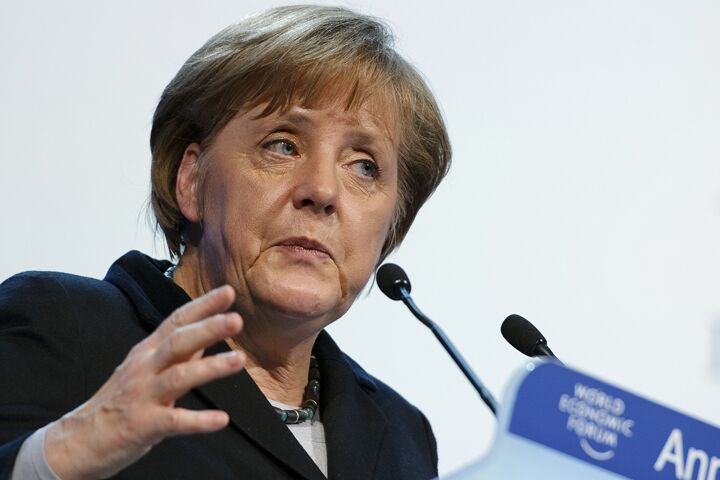
Angela Merkel’s Strident Tone at Davos
Davos is the scene for the annual gathering of global movers and shakers to reflect on the current economic condition of the world. It is the outgrowth of an idea first given air by German-born economist Klaus Schwab.
Schwab launched the European Management Forum in 1971, attracting European business leaders to Davos in Switzerland each subsequent January for an interchange of ideas on a range of business management issues. Over time the agenda was broadened to embrace economic, social and political issues, with world leaders being invited to participate. The gathering then was renamed the World Economic Forum.
One Forum in particular was destined to have powerful effect on the world balance of power. In January 1989, East German Prime Minister Hans Modrow met with German Chancellor Helmut Kohl at the World Economic Forum in Davos to discuss German reunification. Ten months later the Berlin Wall fell. That event was to result in the total dislocation of the status quo that had obtained for over 40 years under the prevailing balance of power between the United States and the ussr.
Track forward to the current Davos summit. What began in 1971as a German idea, used as a forum 18 years later for the leaders of East and West Germany to set the scene for reunification of the German nation, 22 years further on features as its keynote speaker the current chancellor of Germany, Angela Merkel.
The chancellor’s speech was a milestone in the coming of age of the newly assertive German nation. It pulled no punches in declaring a German agenda for Europe.
In one of the key statements Merkel made in that speech, unequivocally endorsing the transfer of European Union member nations’ sovereign powers to EU imperial control, she declared:
We will only be able to strengthen our common currency if we coordinate our policies more closely and are prepared to gradually give up more powers to the EU. If we make loads of promises about debt reduction and sound budgeting, those need to be things that can be enforced or brought to court in the future. The point of the fiscal compact, after all, is to make it possible to check on those commitments. That means giving our [European] institutions more monitoring rights—and more bite.
Further emphasizing the German agenda for a Germanized Europe, Merkel even indicated that Germany is “the representative of all European countries,” emphasizing that her solution to today’s Europe in crisis is “more ‘integration,’ by transferring more powers from a national level to EU institutions such as the European Court of Justice, so that the continent is ‘turned into a Europe that works’” (EUobserver.com, January 26). No doubt a Europe that is forced to work the German way!
EUobserver.com referred to Chancellor Merkel’s “ranking as the de facto supremo of Europe” as being “highlighted by the plethora of top European politicians and financiers she received in Berlin ahead of an EU summit taking place in Brussels on January 30.
“The leaders of Portugal, Sweden, Austria, Belgium, Italy and imf chief Christine Lagarde all visited Merkel in the past few days, with Spain’s Prime Minister Mariano Rajoy set to do the same on Thursday” (ibid).
Glaringly absent from the spotlight that blazed on Chancellor Merkel was the leader of Germany’s former partner in promotion of the European imperial dream, France. President Nicolas Sarkozy is today but the poodle that trots behind the German shepherd. This fact even further served to highlight that Europe is today being led, dominated and domineered by but one nation and one singular nation alone—Germany.
Yet perhaps the truest indication of that which is really emerging in Europe was hidden within a paragraph in Wednesday’s edition of the New York Times (emphasis added):
The most powerful leader in Europe may be Mario Draghi, president of the European Central Bank, who was appointed by elected officials but cannot be fired and is independent of political control. So it is telling that in a city full of banks, the Frankfurt version of the Occupy movement chose the central bank’s lawn as a place to set up its tents. Participants said they were protesting its lack of democratic accountability. Meanwhile, Greece and Italy are led by unelected technocrats whose selections were strongly influenced by Germany.
There, encapsulated in few words, is summarized the rise to dominance of an age-old power, a “holy” Roman imperial power, that is rapidly emerging on the European continent.
The unfettered power of a Jesuit-educated son of Rome controlling the world’s largest bank, added to the diminution of democracy within a Europe gradually being taken over by unelected technocrats whose selection is “strongly influenced by Germany,” is but another remarkable proof of the fulfillment of the prophecies that Herbert Armstrong published and broadcast for decades before the current-day reality of the final resurrection of the Holy Roman Empire.
“I have been proclaiming and writing, ever since 1935, that the final one of the seven eras of the Holy Roman Empire is coming in our generation—a ‘United States of Europe,’ combining 10 nations or groups of nations in Europe—with a union of church and state! … In only one way can this resurrected Holy Roman Holy Roman Empire be brought to fruition—by the ‘good offices’ of the Vatican, uniting church and state once again, with the Vatican astride and ruling (Revelation 17:1-5)” (Herbert Armstrong, Plain Truth, January 1979).
Clearly, the signs are that Rome and Berlin are emerging as the most potent forces forging a virtual resurrection of that old Holy Roman Empire.
